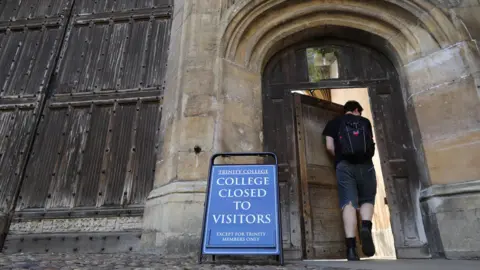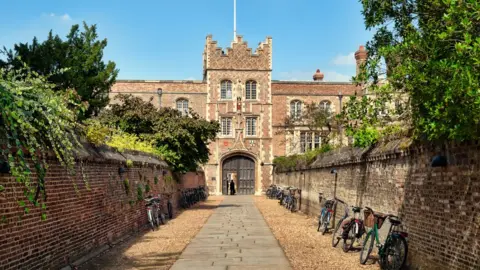Cambridge University: Reviews after recent student deaths
 Getty Images
Getty ImagesCambridge University is holding a review after five students died in recent months.
One of the deaths, which all happened between March and June, has been confirmed as a suicide, while four others are suspected suicides.
Senior pro vice-chancellor Prof Graham Virgo said it had "distressed the whole of the university community".
Learning from an initial review after the first four deaths was being used as part of ongoing plans, he added.
A second-year history student died in March 2022, three other students died in May and another died in June.
The history student's inquest heard he was "on course to finish as one of the most accomplished students in his year".
Cambridgeshire and Peterborough assistant coroner Simon Milburn said there was "absolutely no indication that he was struggling".
The inquest heard he had no contact with college counselling services and his GP confirmed there was no history of mental health issues.
- If you are feeling emotionally distressed, help and support is available via BBC Action Line
The head of charity Survivors of Suicide, Claire Curran, who has been supporting his family, said: "Like any family who are bereaved by suicide they are devastated, they are distraught, very traumatised, really struggling to get their heads around what's happened; immense sadness.
"This is not the kind of death that anyone ever wants to experience."
She added it was "really important" to let people know there were support services available and to make sure they were accessible when needed.
Cambridge University has collated the number of student suicides since 2017-18, according to a Freedom of Information response.
Over the four years prior to 2021-22, four students were confirmed to have died by suicide, with one suspected.

Following the fourth death this year, the university approached the NHS and public health agencies to set up an investigation group to "review what has happened and what the lessons [are] that we can learn," Prof Virgo said.
"One thing that came out of the review was that there was no common cause behind these student deaths, but we have, reflecting on the discussions arising from the review, considered various aspects of our practice," he said.
"We already have, for example, training relating to suicide prevention and we want to ensure that training is as good as it can possibly be."
The fifth death occurred after the start of that review and is currently under review itself. These reviews are separate from coroner's inquests.
Prof Virgo said: "We consider all the student deaths that have occurred at the University of Cambridge to be tragic and very concerning. We are not in a position to speculate as to what happened in these cases.
"But we are engaging very carefully with the whole student population with professionals within the university and outside to get a better understanding of what might be going on. I am not in a position to say it is one particular cause.
"It is undoubtedly complex, but it is something that we are seeing throughout the country and certainly throughout the university sector."
 PA Media
PA MediaIn 2021, 2,123 students accessed the university's central mental health service while 453 used college-based services, compared to 1,655 and 136 respectively in 2017.
Ben Dalitz, the student union's welfare and community officer, said that universities had been tasked with creating a suicide prevention policy by the government, but an initial draft of Cambridge's had been "altered quite a lot".
"University senior leadership buckled under pressure from the heads of colleges to water down the policy and we've been really quite concerned to see what started as a conversation about student safety turning into one that's really about legal liability," they said.
Prof Virgo said the university already spends £4.5m a year on mental health and wellbeing, and will be allocating an additional £5m over the next five years.
"Working together, the University and Colleges have been developing and implementing an action plan, much of which was in development before these tragic deaths, which further enhances the support available for students," he said.
He said their plans included an "increase in investment into the university counselling service and dedicated wellbeing advisors in colleges to enable early identification of students in distress".
A spokeswoman from Cambridgeshire and Peterborough Integrated Care System (ICS), which was involved in the review, said: "We want to express our deepest condolences to the families and our thoughts are with them and friends of those who have been affected.
"We're committed to working together to ensure that we support our most vulnerable people with managing their mental health."
 Getty Images
Getty ImagesAccording to the most recent data from the Office of National Statistics (ONS), published in May, the suicide rate for higher education students in the academic year ending 2020 in England and Wales was three deaths per 100,000 students, the lowest rate in four years.
Between 2016-17 and 2019-20, students also had a significantly lower suicide rate compared with the general population of similar ages.
Prof Steve West, the president of Universities UK, which represents 140 universities, said the sector shares a "resolute commitment" to prevent student suicides.
"Across the UK, we are seeing an increase in the number of young adults experiencing mental ill health and this is reflected in student populations, with increasing demand for support and treatment both in universities and the NHS.
"Whilst there is no evidence that overall numbers of student deaths by suicide are increasing, risk factors such as self-harm, depression, debt, disengagement and loneliness mean that universities need to be vigilant to spot the signs and respond quickly."
Ms Curran added the history student's family would say that "no matter how bad things are, ending your own life is not the answer.
"No family want to go through this pain. No family want to feel this devastation. Please, please, please talk to someone and get some help, because people really do care."

Find BBC News: East of England on Facebook, Instagram and Twitter. If you have a story suggestion email [email protected]
